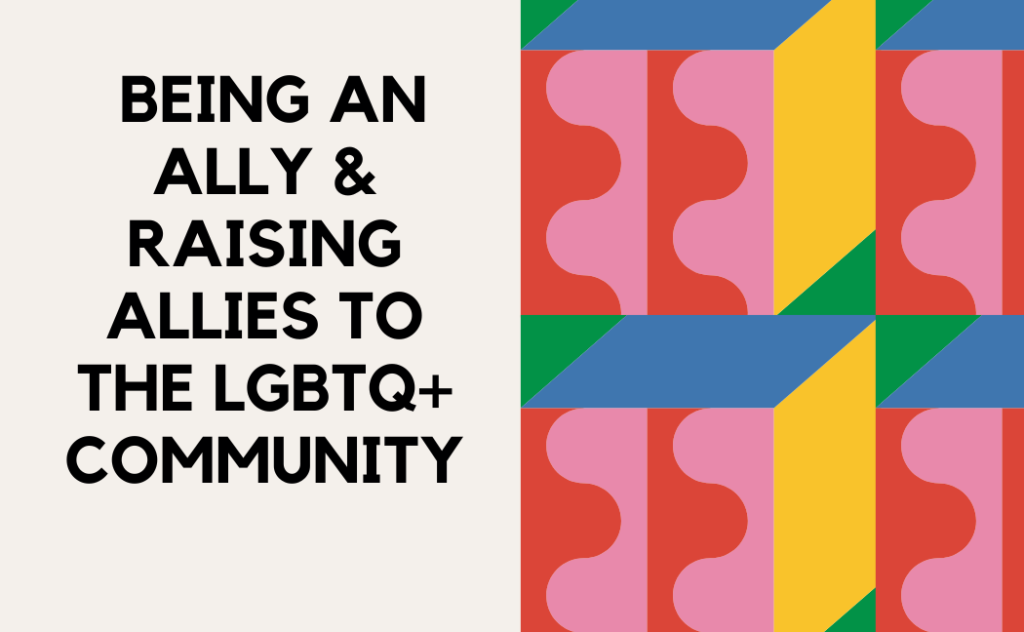In today’s world, fostering an inclusive and accepting society is more crucial than ever. One significant way to contribute to this goal is by being an ally to the LGBTQ+ community and raising children to be allies as well. In this post, we explore the importance of allyship, debunk common misconceptions, and provide practical advice for parents on how to support and advocate for LGBTQ+ rights. Check out our podcast episode on being an ally below.
The Importance of Allyship
What Does It Mean to Be an Ally?
An ally supports and stands up for the rights and dignity of LGBTQ+ individuals. Being an ally involves educating oneself about the challenges faced by the LGBTQ+ community, speaking out against discrimination, and actively promoting equality and acceptance.
Why Is Allyship Important for the LGBTQ+ Community?
Allyship plays a critical role in the fight for LGBTQ+ rights. Allies help create safe spaces, amplify LGBTQ+ voices, and drive social change. Their support significantly impacts the mental health and well-being of LGBTQ+ individuals by providing validation and reducing feelings of isolation.
Common Misconceptions About Allyship and the LGBTQ+ Community
Myth 1: Only LGBTQ+ Individuals Need to Worry About LGBTQ+ Issues
This misconception overlooks the fact that everyone benefits from a society where equality and acceptance are the norms. Allies help to foster environments where all people, regardless of their sexual orientation or gender identity, can thrive.
Myth 2: You Have to Be an Expert to Be an Ally
Being an ally doesn’t require you to have all the answers. It’s more about being willing to learn, listen, and support. It’s okay to make mistakes and learn from them along the way.
Myth 3: Allyship Is a One-Time Action
Allyship is an ongoing commitment. It involves continuous learning, unlearning biases, and standing up for LGBTQ+ rights consistently.
How Parents Can Be Allies
Educate Yourself
One of the most crucial steps parents can take is to educate themselves about LGBTQ+ issues, history, and terminology. Understanding the community’s struggles and experiences helps parents provide better support.
Resources for Education:
- Books: “This Book Is Gay” by Juno Dawson, “Redefining Realness” by Janet Mock
- Documentaries: “Disclosure” (Netflix), “The Death and Life of Marsha P. Johnson” (Netflix)
- Websites: GLAAD, The Trevor Project
Support and Affirmation
Parents can support LGBTQ+ individuals by affirming their identities and using correct names and pronouns. This simple act of recognition can significantly boost an LGBTQ+ person’s self-esteem and mental health.
Impact on Mental Health
Studies show that LGBTQ+ youth who have supportive families are less likely to experience depression, anxiety, and suicidal thoughts. Acceptance and support can make a profound difference in their overall well-being.
Advocacy and Visibility
Parents can advocate for LGBTQ+ rights in their communities and workplaces. Being visibly supportive, such as participating in Pride events and displaying inclusive symbols, sends a strong message of acceptance and solidarity.
Modeling Inclusive Behavior
The Importance of Inclusive Language and Behavior
Children learn by observing their parents. When parents use inclusive language and demonstrate respectful behavior towards LGBTQ+ individuals, it sets a powerful example for their children.
Tips for Incorporating Inclusive Practices:
- Use Gender-Neutral Language: Avoid assuming someone’s gender based on appearance. Use terms like “partner” instead of “husband” or “wife.”
- Celebrate Diversity: Expose your children to diverse books, movies, and stories that include LGBTQ+ characters and themes.
- Speak Out Against Discrimination: Teach your children to recognize and speak out against homophobic or transphobic comments and actions.
Conclusion
Being an ally to the LGBTQ+ community and raising children to be allies requires effort, education, and a commitment to equality. By taking these steps, parents can help create a more inclusive and accepting society, where everyone, regardless of their sexual orientation or gender identity, feels valued and supported. Your actions, no matter how small they may seem, can make a significant impact in the lives of LGBTQ+ individuals and contribute to a more just and compassionate world
